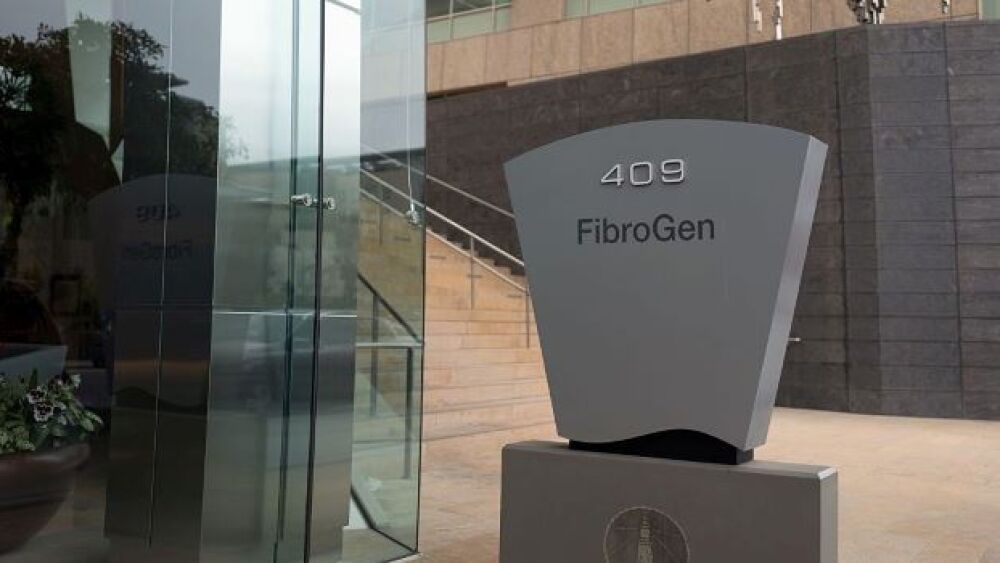FibroGen takes another hit as its antibody hopeful fails in a second indication. The biopharma says that it is cutting costs to extend its cash runway.
Pictured: FibroGen sign in front of building/Getty Images, Smith Collection
FibroGen announced Monday that its potential first-in-class antibody has struck out again this month. Pamrevlumab failed to meet the study’s primary or secondary endpoints in patients with idiopathic pulmonary fibrosis (IPF).
In the Phase III ZEPHYRUS-1 trial, the mean decline in forced vital capacity (FVC) from baseline to week 48 was 260 ml in the pamrevlumab arm compared to 330 ml in the placebo group—not enough to meet the primary endpoint. The disease progression secondary endpoint was also not met.
Based on this failure, FibroGen called it quits on a second Phase III trial for IPF, ZEPHYRUS-2, which had an anticipated readout for the middle of next year.
Earlier this month, FibroGen announced pamrevlumab also failed a Phase III trial for non-ambulatory patients with Duchenne muscular dystrophy (DMD). Analysts called the DMD trial a “high-risk be,” and looked forward to a more important dataset in the IPF indication.
The antibody is still in clinical trials for ambulatory DMD, with expected results next quarter, and locally advanced unresectable pancreatic cancer (LAPC), to report in mid-2024.
With this latest hit, FibroGen said in its announcement that it plans to implement a significant cost reduction to extend its cash runway into 2026. The San Francisco–based company has not stated whether this will involve layoffs of its 450–500 U.S. employees.
FibroGen’s stock fell around 12% pre-market after the Phase III failure was announced.
IPF Is a Tough Target
FibroGen is not the first company to face a late-stage flops in IPF. Roche put down $390 million upfront for Promedior and its fibrotic treatment portfolio in 2019. Its IPF asset, zinpentraxin alfa, was the heart of the deal, having already received Breakthrough Therapy designation from the FDA.
In its 2022 earnings report, Roche revealed it had stopped the pivotal Phase III trial of zinpentraxin alfa for futility.
IPF is a chronic and progressive lung disease with a poor long-term prognosis for patients, with a five-year survival rate of approximately 20%. Despite R&D efforts, no new drugs have been approved for the indication since two antifibrotic drugs hit the market in 2014.
Boehringer Ingelheim currently has an oral PDE4B inhibitor in Phase III trials for IPF. The FDA granted Breakthrough Therapy designation to the asset after a Phase II trial that suggested BI 1015550 prevents lung function from worsening in IPF patients. The Phase III trial has an estimated completion date of November 2024.
Kate Goodwin is a freelance life science writer based in Des Moines, Iowa. She can be reached at kate.goodwin@biospace.com and on LinkedIn.






